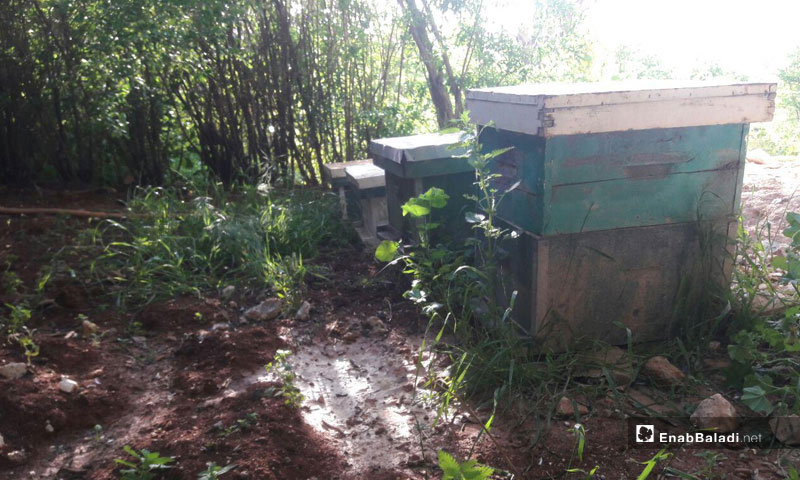



The long years of war have caused a deterioration in beekeeping in Daraa governorate, a profession the governorate is famed for and one of Syria’s major sources of honey production.
The current inflation is due to several reasons; military action and bombardment are included, backed by weather-related factors, and other medical ones, which all have cost the beekeepers this year’s honey.
The military operations contributed to obstructing the beekeeping industry in Daraa governorate, as it was difficult to move beehives from one place to another, which ended up neglected.
Abu Omar, an engineer specialized in beekeeping, originally from the Daraa, had once owned 200 beehives. Requesting that he stays anonymous for security considerations, he told Enab Baladi: “Bee farming has deteriorated by 70%, compared to the industry prior to the war.”
The engineer explained that beekeeping is dependent on changing the hives’ locations several times as we move into each of the year’s seasons in search of farms and honeybee-friendly plants. This was not much of a choice, for all sort of connection between the governorate and other areas, inside and outside it, are severed, and particularly because hives can be only transported to different locations at night.
Earlier on, beehives were moved from Daraa to other governorates, Raqqa, for instance, to catch up with the cotton and sunflower season in summer, the coastal areas to utilize the citrus flowers, or western Ghouta to feed bees on anise flower’s nectar in spring.
Let the military operations aside, the transportation costs, security chaos, and lack of daily care also played a role in beekeepers losing their hives, not only seasonal production.
Of many other difficulties, beekeepers are always complaining of the absence of many medications or their rising prices, especially since the majority of the bee treatments are imported and are not available on the local markets, Amitraz, among others.
Abu Diaa, a beekeeper in the Yarmouk Basin area, western Daraa, told Enab Baladi that the shrinking farm areas is not the only reason for the affliction of the industry; additionally, there is the absence of mediations or their rising prices, which forced numerous beekeepers to allocate no attention to their hives, in winter particularly.
The man, in his fifties, added that negligence of the beehives and the conditions engulfing the farming process coerced many beekeepers, himself included, to feed bees on sugar, the average price of a kilo of which was 200 Syrian pounds in the past a few years.
These reasons combined have led to the production of honey that is both very little and of a poor quality, not to mention the diseases that afflicted the honeybees with the shortage on needed medications, such as varroa destructor, wasps and foulbrood. These factors decreased the amount of honey produced, for instead of generating 15 kilograms, each hive toady gives five kilograms only, the types of which fail to meet the required specifications, according to engineer Abu Omar.
Located in western Daraa, the Yarmouk Basin ranks first in honey production, given its fertile soil and the availability of a moderate climate throughout the year.
Nonetheless, the many military operations between Assad’s forces, the opposition factions and the “Islamic State” (ISIS) in the past years, which the area provided a stage for ended with the destruction and complete loss of the majority of bee yards, in addition to the thefts and the plunders that targeted them.
Abu Mohammad used to own 150 beehives in the Yarmouk Basin, but he is left with none of them after the military operations forced him to abandon the area without being able to move the hives or provide them with the needed care.
“Upon my return, no bees were left, and I found none of the wood that constituted the hives, knowing that the price of a single hive, inhabited by its bees, is about a hundred thousand Syrian pounds,” Abu Mohammad added.
“Assad’s forces spared nothing; confiscating everything including sheep, cars and beehives. We ask God for reward; there is no power and no strength save in God.”
In 2014, ISIS took over the Yarmouk Basin after it was controlled by the opposition factions, to be then [re]controled by the Syrian regime in 2018.
According to Fatouh Jumaa, the Director of the Syrian Secretariat of Beekeepers Union, Syria’s honey production amounted to three thousand tons before 2011, while, today, the production does not exceed 600 tons, given that the local market’s need, as NASA reported, is 1500 tons.
if you think the article contain wrong information or you have additional details Send Correction